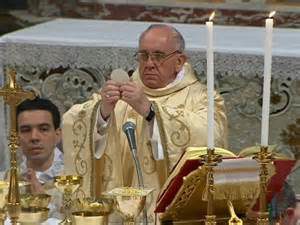 The Catholic Church believes infallibly (without the possibility of error) that Jesus is present body, blood, soul, and divinity in the Holy Eucharist. This dogma is clearly revealed in scripture. Take a look at the “Bread of Life” discourse found in John chapter 6 where Jesus says:
The Catholic Church believes infallibly (without the possibility of error) that Jesus is present body, blood, soul, and divinity in the Holy Eucharist. This dogma is clearly revealed in scripture. Take a look at the “Bread of Life” discourse found in John chapter 6 where Jesus says:
- I am the living bread that came down from heaven; whoever eats this bread will live forever; and the bread that I will give is my flesh for the life of the world.
- Amen, amen, I say to you, unless you eat the flesh of the Son of Man and drink his blood, you do not have life within you. Whoever eats my flesh and drinks my blood has eternal life, and I will raise him on the last day. For my flesh is true food, and my blood is true drink. Whoever eats my flesh and drinks my blood remains in me and I in him. Just as the living Father sent me and I have life because of the Father, so also the one who feeds on me will have life because of me. This is the bread that came down from heaven. Unlike your ancestors who ate and still died, whoever eats this bread will live forever.”
During the last supper, Jesus declared that He was going to remain with his disciples under the form of bread and wine. In the institution of the Eucharist, Jesus consecrates the bread and wine with the words “this is my body” (Luke 22:19) and “this is my blood” (Luke 22:20). Jesus states this as an absolute, and is in no way left up to interpretation. In the next lines, Jesus institutes the priesthood with the words to His apostles “Do this in remembrance of me” (Luke 22:19). It is interesting to note, that the word remembrance in the Hebrew sense is not a word meaning “to recall a time in the past,” as it is generally used. Rather, the word remembrance means, “to call forth the past into the present.” In other words, Jesus was instructing His apostles to bring this event into the present, which is what the priest does at each Mass.
When the priest who is acting in persona Christi (in the person of Christ) recites the words of consecration during Mass, the bread and wine become, through the occurrence of transubstantiation (change of substance), fully and completely, the body, blood, soul and divinity of Jesus Christ. With the consecration of the bread and wine at each Mass, Jesus’ sacrifice is re-presented to us.
It is in this way that Jesus chose to stay with His Church. There is not a more intimate way that we could experience the love of Christ, than with His very life inside of us. Jesus states in John 6:53 “unless you eat the flesh of the Son of Man and drink his blood, you do not have life within you.” The Eucharist is our strength in life, which gives us courage and conviction in our journey with Christ.
From the website “Why Do Catholics Do That: The Truth of the Catholic Church One Post at a Time.”
